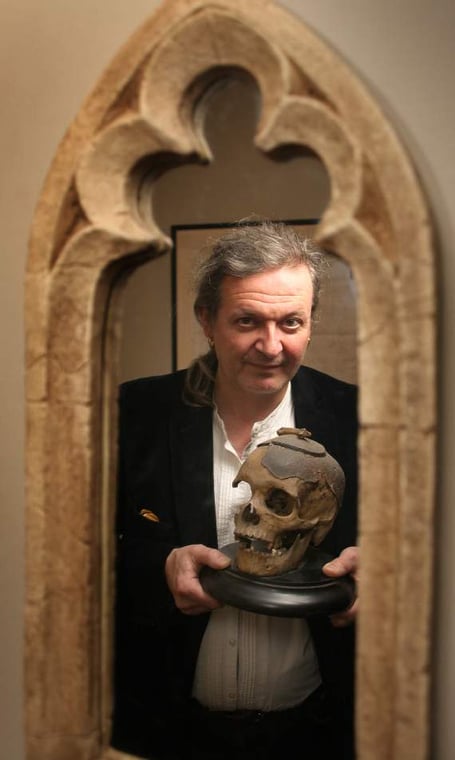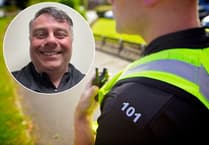FOR a man who has earned the popular sobriquet of the ’Prof of Goth’ through his academic and literary works and who could tell a tale or two about vampires, Nick Groom is certainly a man who likes to get his teeth into a subject.
Nick is acknowledged as a world expert on the tragic 18th century poet/forger Thomas Chatterton and has written several books ranging from the history of the Union Jack, Introducing Shakespeare, the formation of the English ballad to the acclaimed The Seasons: An Elegy for the Passing of the Year’ (a runner-up for the BBC Countryfile Book of the Year 2014).
Nick, who lives at South Zeal, is a professor of English at the University of Exeter and co-director at the Exeter Centre for Literatures of Identity, Place and Sustainability. He also teaches the only undergraduate course on Lord of the Rings author J R Tolkien.
Nick, aged 51, possesses a most impressive résumé. Among his academic achievements are a double first in English Language and Literature from Oxford, senior lecturer in post medieval literature at the University of Bristol and visiting professorships from the prestigious Universities of Stanford and Chicago in the United States.
He also investigates authenticity in the world of literary forgery, has published works on the emergence of national and regional identities, not to mention essays on Nick Cave, an Australian singer-songwriter whose music and lyrics reflect death, religion, love and violence. He also has documented considerable research into popular folklore and culture. It’s quite a lengthy CV!
Nick moved to South Zeal nearly 25 years ago and loves the community he lives in, alongside his wife Joanne and daughters, Matilda, aged 7, and Dorothy, 5.
His love of history stemmed from his exploration around the world around him when he was the boy.
‘Where I was brought up I noticed these abandoned wartime airfields and there were lots of remnants such as abandoned pill boxes. Their gradual destruction was like seeing history disappearing in front of my eyes.
‘I have always had a love of literature and interest in history and heritage. I like to see history not necessarily in terms of events but more through the eyes of people in the past and their emotions, passions and memories and what they can teach us. We, ourselves, will be the history of the future and I think it important that our traditions, customs, festivals and celebrations are handed down to the next generation.’
Recently appointed as chairman of the Devon branch of the Campaign for the Protection of Rural England (CPRE), Nick is equally passionate about the countryside.
‘I was really delighted to be asked to be CPRE chairman and I take seriously my role to campaign against unsightly phone masts in rural areas, wind turbines on the edge of national parks and those issues which affect the environment in the broadest sense.
‘We must retain a connection with the natural world and environment around us, the rhythm of the seasons, the fauna, the flora and the weather. It is important how we care and manage our countryside and have a co-ordinated regional and national plan for its future.
As an owner of a small flock of Black Welsh Mountains sheep himself, Nick advocates people make the connection with food production.
‘It sounds simple but it is important that people shopping realise their food comes out of a field, not from out of a supermarket fridge!’
Farming, he says, has a great effect on the shape of the landscape.
‘Since I came here almost three decades ago, the moors around me have changed dramatically and have become infested with bracken. We need more ponies and sheep grazing our moors and more diversity of plant life.’
Traditions and folklore are not just part of Nick’s academic life but also something he happily encourages in his own community through his chairmanship of the Sticklepath Fire Show and his involvement with the Grey Mare Festival.
The latter is based on the well-known Devon folk song about a man called Tom Pearce, whose horse dies after someone borrows it to travel to the fair in Widecombe with his friends - Bill Brewer, Jan Stewer, Peter Gurney, Peter Davy, Dan’l Whiddon, Harry Hawke, Old Uncle Tom Cobley and all.
Research suggests that the names originally referred to real people.
The ghost of the Grey Mare is, as legend has it, a benevolent spirit which would protect the village from ill-fortune, ’provided the people showed true harmony among themselves and proper respect for ‘the other world’.
The Fire Show itself is a charity that promotes arts and crafts for young people, encouraging them to make things, as well as teaching children circus skills and providing story telling, drama and seasonal workshops.
‘All traditions have to have a day one and indeed, only become a tradition after they have a day one,’ said Nick. ‘The Grey Mare Festival, held on Halloween is an alternative to the American tradition of trick or treat. It’s a night where adults and children instead of staying indoors and watching television or just playing on their computer games, come out and get together, have fun with the neighbours and enjoy the community spirit.’
The media has named him the ‘Prof of Goth’, one that is entirely appropriate for someone who lectures and writes on the lasting reputation of a Eastern Germanic people who played a part in the fall of the Roman Empire and sacked Rome in 410AD.
The Goths, considered barbarous by the Romans, have been attributed lasting legacy to this day – particular through their apparent influence on medieval and renaissance architecture and their cultural literary links to Mary Shelley’s Frankenstein and Bram Stoker’s Dracula.
‘History can be viewed in many ways. Were the Goths, as the Romans saw them, barbarian destroyers or were they just a people resisting tyranny? This question of ‘barbarity’ still continues in the present day. The Goths were not savages, they had their own social and governmental systems and only became sucked reluctantly into the Roman Empire to get away from the Huns!’
Far from being ‘barbarian’ their reputation spread throughout Western Europe, particularly between 1050AD and the 16th century. The 500 year-old Exeter Cathedral is a fine example of the Gothic style.
‘Gothic pointed arches, ribbed ceilings, vaulting, tall spires were, to those in the past who preferred classical style of architecture, seen as monstrous.’
However, Nick said in the 18th century that the English began to have more of an interest in national history and heritage and began to appreciate the value of the Gothic influence on many of its most important buildings.
‘By the 19th century the British were very proud of the progress of the nation, having shrugged off petty rulers and too powerful kings in heading for democracy. But progress came at a cost with wars and destruction and the misery of many.
‘The memories of a brutal English Civil War were still strong. History does not go away. As the British Empire grew it not just spread “Civilisation and Christianity” but conversely smallpox, flu and the exploitation of the people and lands it conquered. This guilt began to haunt some parts of British society and this comes through in many novels of the time.
‘Rationality began to give way to interest in the supernatural. Figures such as Shelley’s Frankenstein personify these fears and Dracula dramatises the cost of this “progress”.
‘Vampires are a fairly recent phenomena, associated with Eastern Europe. In Victorian times vampires embodied anxiety and the instability of international politics coming to haunt Great Britain. On one hand Dracula was seen as linked to the past of the barbaric tribes but at the same time he is also a sophisticated character, who owns property and is a seasoned traveller.
‘Figures like vampires are not just regarded as ancient superstition, they are more contemporary. Unlike other supernatural figures, such as zombies, vampires are sentient and have emotions we, as humans, can relate to although that doesn’t mean we necessarily want to share the world with them!’
It is believed that Bram Stoker’s Dracula was inspired by Lewtrenchard writer, the Reverend Sabine Baring-Gould, who wrote many a ghost story and was a collector of folk tales and songs.
Dartmoor itself is well served with vampires and other supernatural figures, says Nick, such as Lady Howard who legend says travels every night from Tavistock to Okehampton in a coach made of bones and accompanied a black dog and the Hairy Hands, which supposedly force drivers off Devon roads at night.
Nick said it is important to pass such stories down to the next generation and hopes to appeal, through his work and lectures as the ‘Prof of Goth’, to them.
‘I don’t want to separate Gothic literature from those who dress up in heavy eyeliner and have spiky hair or enjoy Nick Cave music.
‘Much of the Gothic inspired figures and its associations of violence and death are part of modern pop culture and video games, but treated at being at the bottom of our cultural hierarchy.’
However, argues Nick, culturally established Shakespearean figures such as Macbeth and King Lear are perhaps just as violent, if not more.
‘They can all be ways of helping us face up to the inevitable — death. Death must not be sanitised.
‘It would be wrong to think that someone who immerses himself into the darker corners of the human psyche is one who does not appreciate his modern surroundings.
‘I have lived in South Zeal for nearly 25 years and it’s a wonderful village and a great place to raise our children, as they are growing up in a community where people take a huge interest in their welfare.
‘You meet people from different walks of life here from the blacksmith to the builder to local writers and artists. Oh yes, there’s also some great pubs!’
n Nick is available to talk to groups, particularly schools. For details go to https://humanities. exeter.ac.uk/english/ staff/groom/





Comments
This article has no comments yet. Be the first to leave a comment.